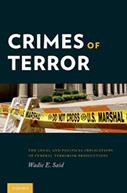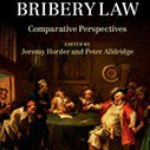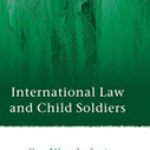Crimes Of Terror: The Legal And Political Implications Of Federal Terrorism Prosecutions

Author: Wadie E. Said
Publisher: New York: Oxford University Press, 2015. 224p.
Reviewer: Brian Forst | March 2017
Federal Prosecutions of Terrorists: Triumph of Madness over Chaos
Civilization has been characterized as the triumph of collective order over chaos, a crowning achievement of the Age of Enlightenment. It might be more accurate to describe it as a triumph of collective madness over chaos, authenticated in marble halls by people in well-tailored suits and high heels, operating under parliamentary rules of order. The manner in which the United States responded to the tragedy of the 9/11 terrorist attack surely reflected more than an element of madness. It was ill-conceived and borne of anger, but legitimized by rule of law and public consent. In launching the War on Terror just nine days after the attack, and in absolutist terms before Congress — “Our war on terror will not end until every terrorist group of global reach has been found, stopped and defeated” — President George W. Bush exuded firm resolve, designed primarily to calm an anxious public. And it worked for a while.
Fifteen years later, this “war” has not been won, and no victory is in sight. Terrorist groups with global reach — first al Qaeda, then the Islamic State, and affiliates of both — are now considerably stronger, collectively if not individually, than in 2001. We face many more terrorists and terrorist threats today. This, too, is clear: the War on Terror was ill-conceived and unwinnable in the first place. As with other unwinnable wars — on crime, drugs and poverty — this one was designed primarily to win short-term political support for tough interventions. Real wars are won through coherent strategic planning, not rhetoric against ideas passed on from person to person, sometimes over centuries. Real wars are fought against sovereign enemies, and they end in the surrender of the defeated. As Ronald Dworkin noted in 2003, “We can conquer Kabul and Baghdad, but there is no place called Terror where the terrorists live.” Nor can any terrorist leader sign a document that will secure an end to the hostilities, as in the case of real warfare.
Still, the tough interventions imposed under this rhetorical war — which, arguably, have contributed to extremism on all sides, fed the recruitment of terrorists in the name of holy war and reified the notion of clashing civilizations — have remained essentially in place. While President Obama called for an end to the “boundless global war on terror” in 2013, the US Congress has expressed an unwillingness to roll back any of the interventions it legislated a decade earlier.
Federal laws against terrorism, used to execute this “war,” fall in a strange netherworld. They attempt to criminalize matters that resemble acts of war, acts that in times of real wars between sovereign nations are typically resolved in military tribunals. Under the War on Terror, the United States has detained hundreds of “enemy combatants” in Guantanamo Bay, and has prosecuted some in federal civilian courts, others in military courts, and still others in neither. The decisions whether and where to prosecute such people are purely discretionary, with advantages to the prosecutor in tribunals, where evidentiary requirements are less stringent. As for those in a limbo seemingly without end, speedy trial rules do not apply.
Wadie E. Said, professor at the University of South Carolina School of Law, addresses most of these and related issues in his book, Crimes of Terror: The Legal and Political Implications of Federal Terrorism Prosecutions (Oxford, 2015). A scholar with experience defending Muslims and Muslim-Americans in federal courts, he became aware of the special challenges confronting this large population of people who are under suspicion not only by the general public, but no less by a system of law enforcement, prosecution and judiciary that has been substantively altered by the War on Terror.
His central thesis is that the War on Terror “threatens to radically change our concept of a free society and the right to be politically or religiously engaged, as the erosion of rights under consideration impacts a particular ethno-religious minority” (p. 8). He argues, more specifically, that the statute banning material support of terrorist groups (Section 2339B, Title 18 of the US Code) should not apply to protected speech, that in prosecuting cases under this ban, the government should be required to show the defendant’s specific intent to advance a group’s illegal goals in order to convict, especially in cases in which the material support is unquestionably humanitarian aid. He argues also that the sentencing enhancement provisions enacted under the War on Terror should be allowed only if the government can demonstrate that the highest standard of evidentiary proof, beyond a reasonable doubt, is met.
Said observes that the War on Terror has expanded executive authority on matters of search and interrogation, detention, and prosecution, and has imposed lengthy sentencing enhancements on those convicted of terrorism offenses, but it has done much more. It has criminalized material support in the form of free speech; multiplied the intrusive tentacles of surveillance throughout Muslim communities; created informants aiming to stir up violent plots without a basis for targeting the individuals recruited; broadened ordinary definitions of terrorism; had a chilling effect on the right of association; and, according to Said, has even contaminated ordinary criminal prosecutions and adjudications in matters that have no connection to terrorism. In the process it has dispirited Muslims, poisoned police-community relations, and undermined the rule of law.
The book is organized along lines that parallel the criminal justice system, starting with a chapter on informants, spies, radicalization, and entrapment; proceeding to a chapter on the evolution of the material support ban noted above; then a chapter on evidence and the prosecution of criminal terrorists; another on the implications of those prosecutions; and finally a chapter on sentencing and confinement. .The propositions advanced are supported with numerous anecdotes, case studies that give credibility to the arguments and generalizations.
The weakest element of Said’s argument is that the vaguely articulated “terrorist exceptionalism” of these expansions has substantively diminished the normal operations of the criminal justice system:
The cases and rulings discussed here have left a precedential trail that has begun to affect the normal course of criminal law enforcement in the United States, as well as having transformed terrorism into a legal trigger for departures from normal rules and constitutional protections. Juxtaposing the criminal terrorism prosecution with the exceptional tactics represented by Guantanamo, torture, etc., which have been more prevalent in public discourse and media coverage, allows us to understand how those extraordinary methods have shaped law enforcement’s counterterrorist response.
Said goes on to say:
In particular, the common thread of terrorist exceptionalism running through the military and criminal justice models has influenced law enforcement practices, which continue to evolve and build on what has come before, in turn expanding the counterterrorism framework and preventive mindset. The Drug Enforcement Agency and Bureau of Alcohol, Tobacco, and Firearms have increased their use of sting operations whereby an informant, usually to mitigate his own criminal charges, entices armed targets to rob imaginary stash houses in the false hope that they contain large amounts of drugs and cash … And, as a result of extensive terrorism investigations, the use of undercover operations and informants has expanded exponentially, now reaching entities like the Supreme Court Police Force and even government agencies like the Department of Agriculture, NASA, and the Small Business Administration.
Data are presented showing an increase in national security prosecutions after the War on Terror was launched, but it is not clear how many of those were associated with terrorism rather than breaches of secrecy, treason, material support of hostile nations, and other national security violations unrelated to terrorism. And to the extent that the increase was actually in terrorist cases, it might well have been caused by any number of factors other than the “war,” including a mix of political, social, economic, and demographic developments. A causal link between the expansion of law enforcement and prosecution authority and the War on Terror, in short, is not so easily established. We are left to accept these connections and fallouts pretty much on faith. It is an interesting, plausible proposition, but it does not meet conventional standards of causal inference.
Said concludes by noting that courts today fail to check and sufficiently counter-balance the government’s expanded tactics and theories associated with terrorist conspiracies, raising questions about the heavy reliance on the criminal process to deal with the problem of terrorism and the deeper issues that give rise to it. On those points there can be little serious dispute, particularly in the face of a crescendo of political drumbeats demanding ever more toughness against “Radical Islam” — a triumph of madness over thoughtful deliberation, if not chaos. The persistent intolerance and political hyperventilation that gave rise to an ill-conceived War on Terror — perhaps more than the “war” itself — may stand as the greatest challenge to our system of justice in the 21st century.
References
Dworkin, Ronald, “Terror and the Attack on Civil Liberties,” New York Review of Books, Vol. 50, No. 17 (November 6, 2003)
Brian Forst is a Professor in the Department of Justice, Law, and Criminology in the School of Public Affairs, American University.


